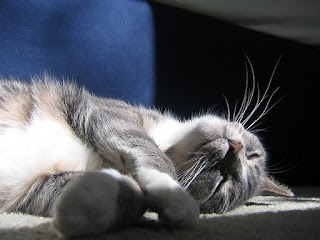A kitten is able to purr by the second day of life, and although he can't meow and nurse at the same time, he can purr and nurse. And the mother cat often purrs back, probably to reassure the kitten. Purring in cats serves as a signal to the nursing mother cat that all is well with her babies and that the milk supply is reaching its destination. She, in turn, purrs, letting the kittens know that she, too, is in a relaxed and cooperative mood. It is believed that purring among adult cats and between adult cats and humans is derived from this primal parent-offspring context. But contentment is not the sole condition for purring. A more precise explanation is that purring signals a friendly social mood and can be employed by an injured cat to indicate the need for friendship. It has been observed that cats in great pain often purr loud and long.
All smaller felines, including the domestic cat, purr! Since the 1970's no one has pursued research into the 3000 year old question, "Why do cats purr?" Perhaps it is because, first we didn't have the knowledge we have now, and second, it was simply easier to assume that cats purr when they are content, which cannot be argued-they do purr when they are content. However, there is more!
As any cat owner knows, there are different "meows" for different emotions. A cat owner knows the difference between their cat's "fearful hiss" and "food meow". This cannot be applied to the purr however. Cats purr even when they give birth or when severely injured. There are cases of cats purring when they are under great stress, as well as when they sit on your lap. The purr is produced under differing emotions or physiological states. .
Natural selection insures that a particular trait be advantageous to an animal. Admittedly, there is some benefit to be obtained from purring to one's self or to kittens, (a sort of kitty lullaby if you wish).Yet, there does not appear to be a strong 'survival' advantage to this behavior. For the purr to exist in different cat species over time, there would have to be something very important (survival mechanism) about the purr. There would have to be a very good reason for energy expenditure (in this case creation of the purr), when one is physically stressed or ill. It would have to be somehow involved in their survival.
Well, guess what? There is ...
Unfortunately, there has been no research that has attempted to explain the extraordinary ability cats have for healing themselves. However, science has shown that the cat's purr is much more than just relaxing, it is the vibration that it produces that is the key! Interestingly, science has known for many years that vibrations at specific levels or frequencies cause healing changes in the body. They can, for example, support bone growth. Bone fractures heal faster and weakened bones begin to strengthen and rebuild.. But it's the cat's "healing by association" that most people find interesting: That ability of a cat to sympathetically help cure illnesses in people simply by being around them! Studies have also shown that owners, especially senior citizens, who have cats have lower blood pressure and can live longer than humans who don't own pets. Many individuals swear they can ease or completely eliminate their migraine headaches simply by lying down with a purring cat next to their head. There is documentation that low frequencies are helpful with regard to pain relief. This vibration stimulation has been found to relieve suffering in 82% of persons suffering from acute and chronic pain.
It is thought that this research could help explain why cats purr, and here is why:
Study groups have recorded many cats' purrs and have discovered that cat purrs create frequencies that fall directly in the range that is ideal for bone growth. A dying cat who could not breath (they were considering euthanasia), was found to breath normally once it began purring. The purring opened up the cat's airway, and improvement was "remarkable" and the next day commenced to eat!
Is it possible that evolution has provided the felines of this world with a natural healing mechanism for bones and other organs? Possible! Being able to produce frequencies that have been proven to improve healing time, strength and mobility could explain the purr's natural selection.
Considering the studies performed by scientists it is certainly not a leap of faith to speculate that the cat's purr is a healing mechanism. Having a natural way to increase strength, and decrease healing time, would indeed be very advantageous and would explain the purr's development. This riddle has lead researchers to investigate how cats purr, which is also still under debate.
Because cats have adapted to conserve energy via long periods of rest and sleep, it is possible that purring is a low energy mechanism that stimulates muscles and bones without a lot of energy. The durability of the cat has facilitated the notion that cats have "nine lives" Purring may provide a basis for this feline mythology., While it is likely that cats purr when they are happy, it is more plausible that cat purring is a means of communication and may assist in the healing process of both the cat and it's owner.
Coming next: cat connection to human companions.
Author Bio: Denis Schwartz
60 y/o retired researcher who just happens to own... 2 cats.... yup, you guessed it! Nappping Persians!! The website: [http://www.nappingpersians.com] is dedicated to them and my life partner.
Article Source: http://EzineArticles.com/396527

